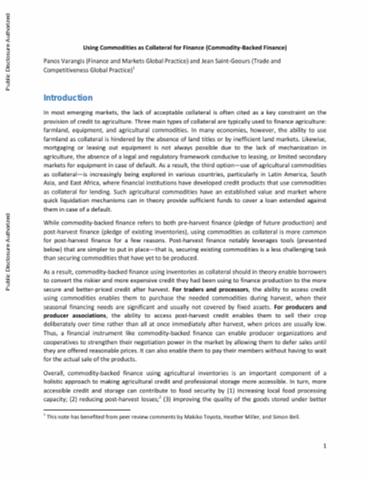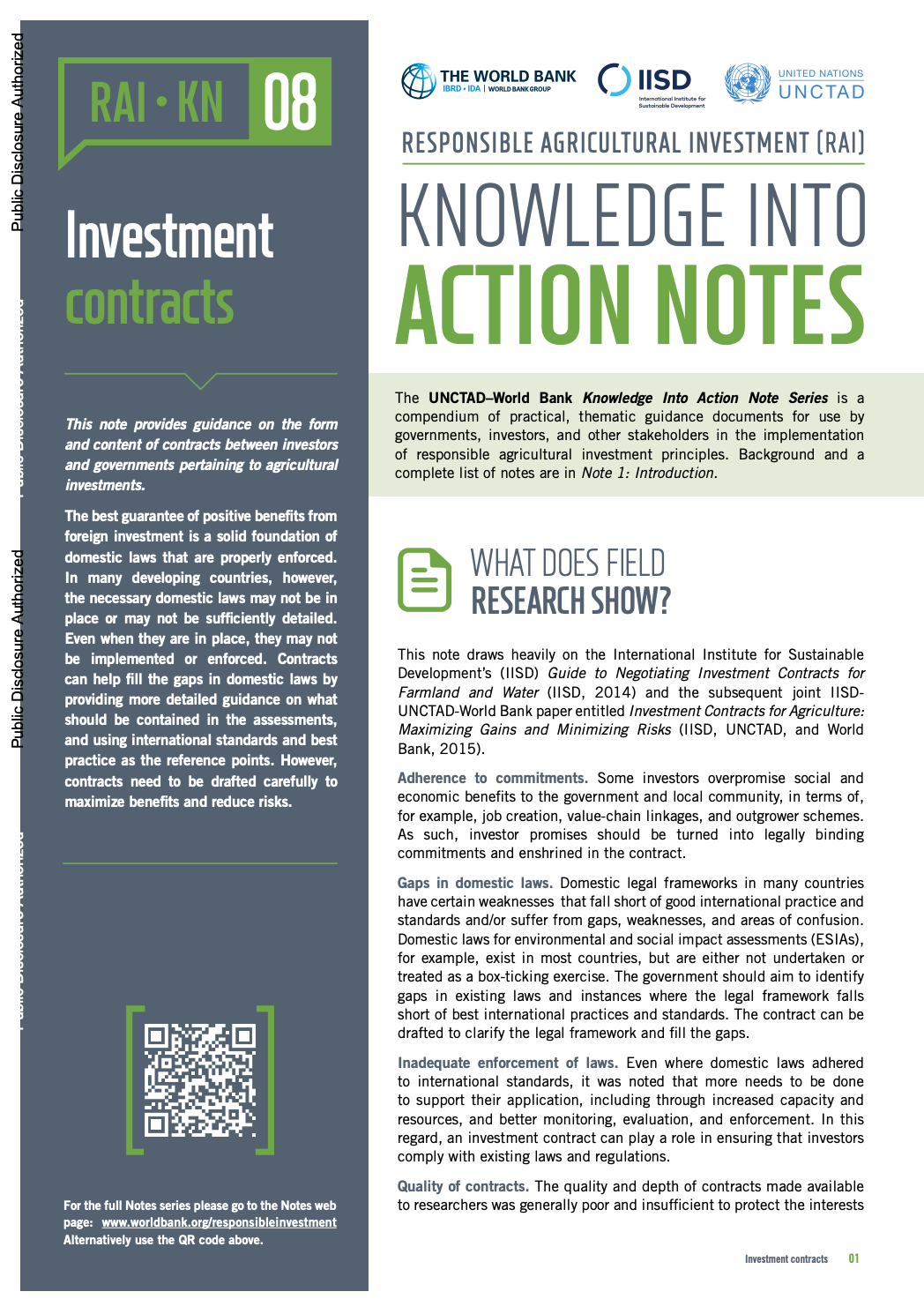Bolivia: Mujeres amazónicas castañeras y su lucha permanente y grupal pese a la sequía
Bolivia: Mujeres amazónicas castañeras y su lucha permanente y grupal pese a la sequía
Claudia Soruco
INTRODUCCIÓN
Using Commodities as Collateral for Finance (Commodity-Backed Finance)
In most emerging markets, the lack of acceptable collateral is often cited as a key constraint on the provision of credit to agriculture. Three main types of collateral are typically used to finance agriculture: farmland, equipment, and agricultural commodities. In many economies, however, the ability to use farmland as collateral is hindered by the absence of land titles or by inefficient land markets.
8 - Investment Contracts - Responsible Agricultural Investment (RAI): Knowledge into Action Notes series
This note is part of an Action Notes series and provides guidance for governments and companies on the form and content of contracts between them in relation to agricultural investments.
Nutrition incentives in dairy contract farming in Northern Senegal
Impact of contract farming on profits and yield of smallholder farms in Nepal: An evidence from lentil cultivation
This study is undertaken to quantify the benefits of contract farming (CF) on farmers’ income in a case where new market opportunities are emerging for smallholder farmers in Nepal. CF is emerging as an important form of vertical coordination in the agrifood supply chain. The prospect for CF in a country like Nepal with accessibility issues, underdeveloped markets, and lack of amenities remains ambiguous. On the one hand, contractors find it difficult to build links in these cases, particularly when final consumers have quality and safety requirements.
Impact of contracts in high yielding varieties seed production on profits and yield
Do development projects crowd out private-sector activities? A survival analysis of contract farming participation in northern Ghana
Contract farming (CF) is attractive as a possible private-sector-led strategy for improving smallholder farmers’ welfare. Yet many CF schemes suffer from high turnover of participating farmers and struggle to survive. So far, the dynamics of CF participation have remained largely unexplored. We employ duration analysis to examine factors affecting entry into and exit from different maize CF schemes in northern Ghana, focusing specifically on the impact of development projects on CF entry and exit.
Contracting by small farmers in commodities with export potential: Assessing farm profits of lentil growers in Nepal
This study is undertaken to quantify the benefits of contract farming (CF) on farmers’ income in a case where new market opportunities are emerging for smallholder farmers in Nepal. CF is emerging as an important form of vertical coordination in the agrifood supply chain. The prospect for CF in a country like Nepal with accessibility issues, underdeveloped markets, and a lack of amenities remains ambiguous. Contractors find it difficult to build links in these cases, particularly when final consumers have quality and safety requirements.
Can contract farming increase farmers’ income and enhance adoption of food safety practices?: Evidence from remote areas of Nepal
Growing inequality has become an important concern in many countries. One of the ways that inequality is perpetuated is through differential market access across regions. This research deals with one of the primary determinants of regional inequality manifested in terms of market access. Nepal is one country where hierarchical geography leads to regional inequality. Differential market access can cause as well as accentuate inequality among farmers.
Knowledge driven development: Private extension and global lessons: Synopsis
Private sector agricultural extension has expanded rapidly in many developing countries in the wake of drastic funding cuts made to public extension systems in the 1980s and 1990s. Motivated by the increase in sales or contract farming revenues that extension can generate, private providers include seed and input companies, distributors and dealers, service providers, food processors and retailers, and mobile phone companies. Mixed public-private systems are now becoming common. How well can the private sector fill the gap left by dysfunctional public systems?












